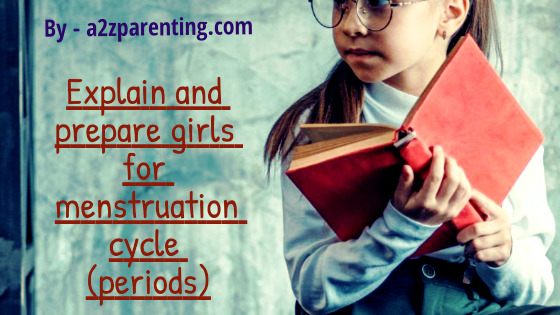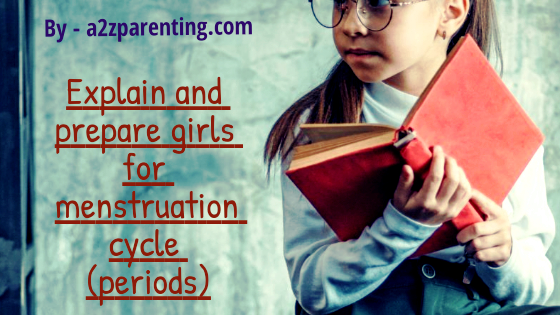Tag: mensuration cycle
Explain and prepare girls for periods
Explain and prepare girls for periods
There is no way that you can know on which day a girl will get her first period, but with the help of some hints, you can definitely prepare your daughter for her first period. Every mother wants to prepare her daughter mentally and physically for her first period, but it is very difficult for them to know when their daughter’s first menstrual cycle will come so that they can prepare their daughter for it. Menstruation is also known as menstrual cycle, or MC and periods.
Mother has an important role in explain and prepare girls for periods (menstruation cycle) – In the olden days, girls did not have any information or knowledge about menstruation and suddenly they used to have menstruation, due to which girls often got nervous and tensed after seeing this. Due to fear and anxiety, girls feel ashamed to tell her own family members. But today’s era has changed.
In today’s era, girls are told about menstruation in many ways, such as by teachers in school, by doctors, through a magazine or books or even through a short film or advertisements. During this time frame, many queries raised in a girls mind as – What is menstruation? What happens in a girl’s body during menstruation? What to do when menstruation comes? How should you keep your body clean at that time?
While specifying about – Explain and prepare girls for periods, for menstruation cycle. Initially certain queries derive in mind as –
How to explain menstruation cycle to children
It is the responsibility of every mother to prepare her daughter mentally and physically for this major change happening in her body. A mother can tell this to her daughter without any hesitation. When her daughter turns 8-9 years old. At this age, she can explain it well so that when her first period comes, she does not have any doubts or worries and she can handle it well. The onset of the menstrual cycle often causes severe abdominal pain and various types of problems, which make girls afraid.
In such a situation, explain to your daughter and increase her courage that this is a rule of nature for which she has to be prepared. Include such things in her diet, which are rich in iron and folic acid. All these nutrients are beneficial for staying healthy and hormonal balance even later.
Share your experience with your daughter. If you share your experience with her, you can help her emotionally. You should explain everything to your daughter like what should she do if she comes to menstruation in school. What should they be used and how make possibilities etc. Give all effective suggestions. First of all you should verify and confirm about – whether your daughter has any information about this or not and you should also have complete information about this.
When you explain to your daughter about menstruation, do not talk to her in a twisted manner, but explain it to her in simple and straight language. She will also understand this very quickly. When you tell your daughter about menstruation, do not think that you only talked once and she understood. Do not do this at all, rather you ask your daughter to tell you about her menstruation every month.
You also continue to explain to them because it is not necessary that menstruation should come every time at the same time and in the same position. So whenever you feel or seems required keep giving advice and keep asking about it as in friendly term and healthy conversation.
How to talk about menstruation?
When girls hear their friends talking to each other in school on or before their menstruation, then they have many questions in their mind. But she feels ashamed to ask her mother and the same is the case with the mother, she too shy away from talking to her daughter. But if you explain to your daughter in simple language then she will definitely understand.
In the beginning, you should focus only on the important things and tell them after how many weeks the menstruation comes. How long does it last and how much bleeding does it take? Also, you tell them tips in dealing with these. You can also give her a book or magazine etc. to read in order to explain it in detail.
Signs your daughter is about to start her periods
In some developed countries, girls have their first menstruation at the age of 12 or 13 years. The signs which indicates about starting of menstruation cycle are as – Before the period comes, hair starts coming on the parts of the body where hair wasn’t before. Hair growth also begins in sexual organs. Shortly after the exit of breast buds, pubic hair ie hair on sexual organs.
This may be a sign of the onset of the period. In addition to breast buds and pubic hair, vaginal discharge also gives you a clear indication that your daughter is about to have periods. At this time, explain to your daughter that now her periods will begin in just a few months. Vaginal discharge begins about six to 12 months before the onset of periods. This means that more estrogen is being produced in the body. Menstruation is the discharge from the uterus and the internal part due to the change in hormones in body.
Preparing girls for their first period (menarche) is an essential part of their development and should be approached with sensitivity and care. Here’s a step-by-step guide on how to explain and prepare girls for menstruation:
- Choose the Right Time: Pick a calm and private moment to have this conversation. It’s best to initiate the discussion well before the expected age of menarche, usually around 8 to 12 years old, depending on the individual.
- Create a Comfortable Environment: Ensure the setting is comfortable and relaxed, so the girl feels at ease to ask questions and express her feelings.
- Start with the Basics: Begin by explaining the concept of menstruation in simple terms. You can say something like, “Every month, a woman’s body goes through changes, and it prepares for the possibility of having a baby.”
- Explain the Menstrual Cycle: Discuss the menstrual cycle, which is the monthly process of shedding the uterine lining when pregnancy doesn’t occur. Use diagrams or visual aids if available to help with understanding.
- Discuss Physical Changes: Talk about the physical changes that accompany menstruation, such as breast development and body hair growth. Emphasize that these changes are normal and part of growing up.
- Address Emotional Changes: Explain that hormonal fluctuations during the menstrual cycle can lead to mood swings and emotional changes. Assure the girl that it’s entirely normal and temporary.
- Discuss Menstrual Products: Introduce different menstrual products like pads, tampons, and menstrual cups. Explain how they work, and let her know that she can choose what makes her feel most comfortable.
- Maintaining Hygiene: Teach proper hygiene practices during menstruation, like changing pads or tampons regularly and washing hands before and after handling menstrual products.
- Addressing Concerns and Fears: Encourage the girl to share her thoughts, concerns, or fears about menstruation. Provide honest and reassuring answers to any questions she may have.
- Normalize the Experience: Let her know that menstruation is a natural part of a woman’s life, and women all over the world go through it.
- Involve a Trusted Female Figure: Sometimes, involving a trusted female figure, such as an older sister, aunt, or close family friend, can provide additional support and perspective.
- Menstruation Kit: Consider putting together a menstruation kit with pads, liners, or other preferred menstrual products, along with some pain relief medication, and keep it easily accessible.
- Encourage Open Communication: Stress the importance of open communication and reassure her that she can always come to you with any questions or concerns about menstruation.
- Celebrate Womanhood: Encourage a positive outlook on menstruation and womanhood. Emphasize that it is a natural and empowering part of growing up.
Remember that every girl is unique, and some may feel more comfortable discussing menstruation than others. Be patient and supportive throughout the process, and allow her to guide the conversation at her own pace.
FAQ’s about Explain and prepare girls for periods (menstruation cycle)
Q1: What is menstruation, and when does it typically start for girls? A: Menstruation is the monthly shedding of the uterine lining, and it usually begins between the ages of 9 and 16, with an average age of around 12 or 13.
Q2: How can I know when my first period is coming? A: While it’s challenging to predict the exact timing of a girl’s first period, signs like breast development, pubic hair growth, and vaginal discharge can indicate that menstruation may start soon.
Q3: How long does a typical menstrual cycle last? A: A menstrual cycle usually lasts between 21 to 35 days, with bleeding lasting for about 2 to 7 days.
Q4: What are the various menstrual products available, and which one should I use? A: Menstrual products include pads, tampons, menstrual cups, and period panties. The choice depends on personal preference, comfort, and the level of menstrual flow.
Q5: Is menstruation painful? A: Menstrual cramps can be uncomfortable for some girls, but they are manageable with pain relief medication and heating pads.
Q6: How can I maintain good hygiene during menstruation? A: Regularly change pads or tampons, wash hands before and after handling menstrual products, and shower regularly to maintain good hygiene during menstruation.
Q7: Can I swim or exercise during my period? A: Yes, swimming and exercise are safe during menstruation. Using menstrual products like tampons or menstrual cups can help stay active and comfortable.
Q8: How can I manage mood swings and emotional changes during my period? A: Understanding that hormonal fluctuations can cause mood swings is essential. Engaging in stress-relieving activities, getting enough sleep, and maintaining a healthy lifestyle can help manage emotions.
Q9: What if my period is irregular or doesn’t start on time? A: It’s normal for periods to be irregular during the first few years. If there are concerns about irregular periods, it’s best to consult a healthcare provider.
Q10: Can I still go to school or participate in activities during my period? A: Yes, menstruation should not hinder daily activities or school attendance. With the right menstrual products and proper hygiene practices, girls can continue their routine activities.
Q11: Is it okay to talk about periods with friends or family? A: Yes, it’s essential to have open conversations about periods with trusted friends and family. Sharing experiences and knowledge can create a supportive environment.
Q12: How can I relieve menstrual cramps and discomfort? A: Applying a heating pad to the lower abdomen, taking over-the-counter pain relievers, or practicing gentle exercise can help relieve menstrual cramps.
Q13: Can I get pregnant during my period? A: While it is less likely, it is still possible to get pregnant during menstruation. It’s crucial to understand safe sex practices and contraception options.
Q14: Should I track my menstrual cycle, and how can I do it? A: Tracking the menstrual cycle can help predict when the next period will start and identify patterns. Apps or calendars can be used to record the start and end dates of each period.


Recent Comment